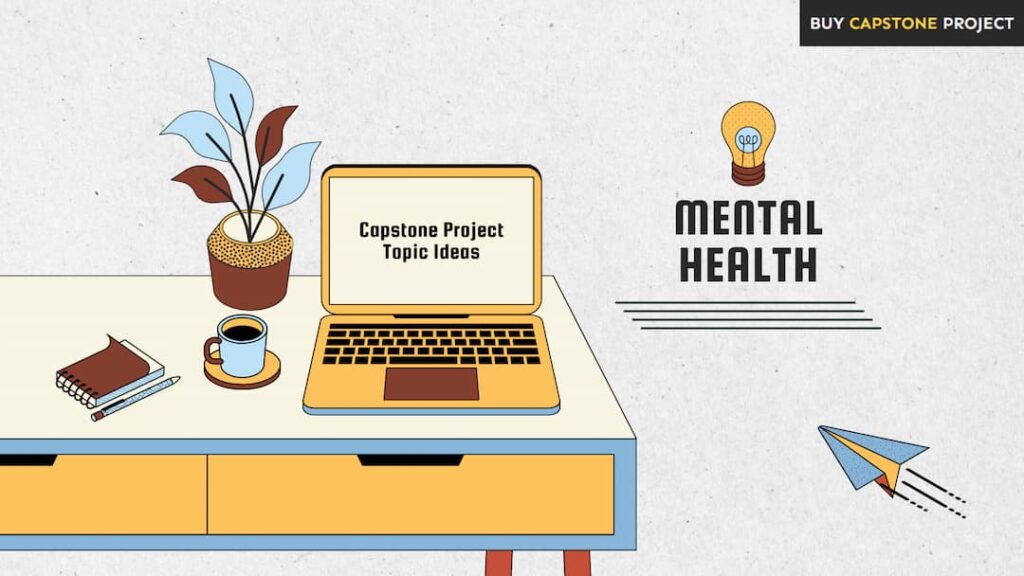TOP Capstone Project Topic Ideas on Mental Health
1. Teletherapy and Mental Health Outcomes
Research Question 1:
How does teletherapy compare with in-person therapy in reducing symptoms of anxiety and depression?
Overview: Students can review clinical data and patient satisfaction surveys to compare treatment effectiveness.
Research Question 2:
What factors influence patient engagement in teletherapy sessions?
Overview: Analyze survey results and interview patient groups to identify key elements that drive participation.
Research Question 3:
How does access to teletherapy affect mental health treatment rates in rural areas?
Overview: Evaluate demographic data and treatment records to assess the role of teletherapy in expanding care.
2. Social Media and Mental Health
Research Question 1:
What relationship exists between social media use and the prevalence of anxiety among adolescents?
Overview: Use survey data and statistical analyses to explore correlations between screen time and anxiety levels.
Research Question 2:
How does exposure to social media content influence self-esteem and body image perceptions?
Overview: Analyze qualitative and quantitative data from interviews and questionnaires to measure impact.
Research Question 3:
What strategies can mitigate the negative mental health effects of social media?
Overview: Review current interventions and pilot community programs to evaluate their effectiveness in reducing harmful impacts.
3. Stigma and Access to Mental Health Services
Research Question 1:
How does stigma influence the willingness to seek mental health care in different cultural groups?
Overview: Compare survey data and interview responses across diverse populations to determine stigma effects.
Research Question 2:
What impact does mental health literacy have on reducing stigma among community members?
Overview: Evaluate education program outcomes and conduct pre- and post-assessments of community attitudes.
Research Question 3:
How do public policies address stigma and improve access to mental health services?
Overview: Analyze policy documents and case studies to assess how regulations shape service availability.
4. Mindfulness and Anxiety Management
Research Question 1:
How effective are mindfulness-based interventions in reducing anxiety symptoms in adults?
Overview: Collect and compare clinical data before and after mindfulness programs to determine measurable improvements.
Research Question 2:
What components of mindfulness training are most beneficial for managing anxiety?
Overview: Use participant feedback and behavioral assessments to identify the elements with the strongest impact.
Research Question 3:
How does the frequency of mindfulness practice relate to long-term anxiety management?
Overview: Conduct longitudinal studies to assess whether increased practice frequency correlates with sustained benefits.
5. Mental Health in the Workplace
Research Question 1:
What are the primary stressors affecting employee mental health in corporate settings?
Overview: Gather data through surveys and interviews with employees to identify common sources of workplace stress.
Research Question 2:
How do workplace wellness programs influence overall mental health outcomes?
Overview: Evaluate program metrics and employee feedback to measure changes in stress and burnout levels.
Research Question 3:
What is the relationship between work-life balance initiatives and employee mental well-being?
Overview: Analyze case studies and survey data to assess how policies affect mental health and productivity.
Yo, if those mental health capstone project topics are stressing you out, our capstone project writers are ready to step in and help you get it done right. Get solid, expert support that transforms your ideas into top-notch work, so you can chill knowing you’ve nailed it!
6. Family Support and Recovery from Mental Illness
Research Question 1:
How does family involvement impact the recovery process for individuals with mood disorders?
Overview: Compare recovery timelines and relapse rates between patients with varying levels of family support.
Research Question 2:
What are the barriers to effective family support in mental health recovery?
Overview: Use qualitative methods such as interviews and focus groups with patients and family members to identify challenges.
Research Question 3:
How can structured family interventions improve treatment outcomes?
Overview: Evaluate the success of family-based therapy programs by reviewing treatment records and satisfaction surveys.
7. Mental Health Among College Students
Research Question 1:
What are the most common mental health challenges faced by college students?
Overview: Survey student populations and review campus health records to pinpoint prevalent issues.
Research Question 2:
How do campus mental health services impact academic performance and retention?
Overview: Analyze data linking service utilization to academic metrics and student retention rates.
Research Question 3:
What role do peer support networks play in managing student mental health?
Overview: Investigate the effectiveness of peer-led programs through surveys and qualitative feedback from participants.
8. Cognitive Behavioral Therapy (CBT) for Depression
Research Question 1:
How effective is CBT compared to medication in treating moderate depression?
Overview: Examine clinical trial data and patient outcomes to determine differences in treatment effectiveness.
Research Question 2:
What factors contribute to the success of CBT in different demographic groups?
Overview: Compare treatment outcomes across age, gender, and cultural groups using statistical analyses.
Research Question 3:
How does the duration of CBT sessions correlate with long-term depression remission?
Overview: Analyze follow-up data from patients to explore the relationship between treatment length and sustained recovery.
9. Suicide Prevention Strategies
Research Question 1:
What intervention methods are most effective in reducing suicide rates among high-risk groups?
Overview: Review case studies and evaluate program data to identify interventions with the greatest impact.
Research Question 2:
How do crisis hotline services influence immediate suicide risk reduction?
Overview: Analyze call data and follow-up outcomes to measure the impact of hotline interventions.
Research Question 3:
What role do community-based programs play in long-term suicide prevention?
Overview: Study community initiatives and survey participant outcomes to assess sustained program benefits.
10. Integrating Mental Health Services in Primary Care
Research Question 1:
How does the integration of mental health services in primary care settings affect patient outcomes?
Overview: Compare patient records and satisfaction surveys from integrated versus separate service models.
Research Question 2:
What challenges do primary care providers face when addressing mental health issues?
Overview: Collect qualitative data from healthcare providers to identify common challenges and propose solutions.
Research Question 3:
How does co-location of services impact the timeliness of mental health interventions?
Overview: Use patient outcome data and service utilization statistics to evaluate the benefits of integrated care.
11. Cultural Competence in Mental Health Care
Research Question 1:
How does culturally tailored therapy influence treatment outcomes for minority groups?
Overview: Compare clinical outcomes from culturally adapted therapies with standard approaches using patient data.
Research Question 2:
What are the main barriers to delivering culturally competent mental health care?
Overview: Use surveys and interviews with both providers and patients to identify obstacles and suggest improvements.
Research Question 3:
How does training in cultural competence affect mental health professionals’ practice?
Overview: Review training program outcomes and correlate them with patient satisfaction and treatment effectiveness.
12. Impact of COVID-19 on Mental Health
Research Question 1:
How did the COVID-19 pandemic affect the prevalence of anxiety and depression in various populations?
Overview: Analyze epidemiological data and survey results from before, during, and after the pandemic to assess changes.
Research Question 2:
What coping strategies proved most effective in mitigating pandemic-related mental health issues?
Overview: Review case studies and participant reports to evaluate the success of different coping mechanisms.
Research Question 3:
How did remote work and learning environments impact mental well-being during the pandemic?
Overview: Collect and compare qualitative and quantitative data on mental health outcomes related to changes in work and education settings.
13. Substance Abuse and Mental Health
Research Question 1:
What is the relationship between substance abuse and the onset of mental health disorders?
Overview: Use clinical data and literature reviews to examine correlations and identify potential causal factors.
Research Question 2:
How do integrated treatment programs address both substance abuse and co-occurring mental health issues?
Overview: Evaluate treatment outcomes from integrated programs using patient records and satisfaction surveys.
Research Question 3:
What challenges exist in preventing relapse among individuals with dual diagnoses?
Overview: Conduct interviews and analyze case studies to understand relapse triggers and prevention strategies.
14. Peer Support Groups for Mental Health
Research Question 1:
How do peer support groups influence recovery outcomes for individuals with anxiety disorders?
Overview: Analyze qualitative feedback and treatment records to assess the impact of peer-led initiatives.
Research Question 2:
What are the benefits and limitations of peer support compared to professional counseling?
Overview: Compare outcomes from peer support groups and traditional therapy sessions using mixed-methods research.
Research Question 3:
How does group composition affect the effectiveness of peer support interventions?
Overview: Evaluate demographic and behavioral data to determine how factors like age, gender, and disorder type influence group dynamics.
15. Nutrition, Exercise, and Mental Health
Research Question 1:
How do dietary interventions impact mood disorders such as depression?
Overview: Review clinical trials and nutritional studies to identify correlations between dietary changes and symptom improvement.
Research Question 2:
What role does physical activity play in managing anxiety symptoms?
Overview: Analyze experimental data and participant feedback to assess the benefits of exercise on anxiety reduction.
Research Question 3:
How does a combined approach of nutrition and exercise compare with standard treatments for mental health conditions?
Overview: Compare treatment outcomes using data from integrated lifestyle intervention programs and traditional therapeutic approaches.
16. Technology-Driven Mental Health Interventions
Research Question 1:
How effective are mobile applications in supporting mental health self-management?
Overview: Evaluate user data and satisfaction surveys from apps designed for mood tracking and stress management.
Research Question 2:
What factors influence user engagement with technology-based mental health tools?
Overview: Analyze usage statistics and conduct surveys to identify key design and content elements that maintain user interest.
Research Question 3:
How can digital interventions complement traditional mental health therapies?
Overview: Compare treatment outcomes from patients using digital tools alongside conventional therapy sessions to assess combined effectiveness.
17. Gender Differences in Mental Health
Research Question 1:
How do mental health disorder prevalence rates differ between genders?
Overview: Review epidemiological studies and survey data to compare incidence rates and identify contributing factors.
Research Question 2:
What gender-specific factors influence the effectiveness of mental health treatments?
Overview: Analyze clinical data and patient feedback to determine how treatment outcomes vary by gender.
Research Question 3:
How do societal expectations and gender roles impact mental health in different populations?
Overview: Use qualitative research methods, including interviews and focus groups, to explore the influence of social norms on mental well-being.
18. Mental Health Policy and Legislation
Research Question 1:
How do recent policy changes influence access to mental health services?
Overview: Analyze government records, policy documents, and service utilization data to measure the effects of legislative changes.
Research Question 2:
What impact have mental health parity laws had on treatment affordability?
Overview: Compare financial data and patient outcomes before and after the implementation of parity laws.
Research Question 3:
How do policy variations across regions affect the quality of mental health care?
Overview: Review regional case studies and comparative analyses to determine how differing policies correlate with service quality.
19. Trauma and Long-Term Mental Health
Research Question 1:
What are the long-term mental health effects of experiencing early childhood trauma?
Overview: Use longitudinal studies and clinical interviews to track symptom development and recovery patterns over time.
Research Question 2:
How do trauma-informed care practices influence treatment outcomes for trauma survivors?
Overview: Compare treatment records and patient feedback from trauma-informed programs with traditional care approaches.
Research Question 3:
What role do community support systems play in mitigating the effects of traumatic experiences?
Overview: Gather data from community programs and support networks to assess their impact on long-term recovery and well-being.
20. Virtual Reality Exposure Therapy for PTSD
Research Question 1:
How effective is virtual reality exposure therapy in reducing symptoms of post-traumatic stress disorder?
Overview: Analyze clinical trial data and patient assessments to compare VR-based therapy with conventional exposure methods.
Research Question 2:
What technical and clinical factors influence the success of virtual reality interventions in PTSD treatment?
Overview: Evaluate technical specifications and therapeutic protocols to identify elements that correlate with improved outcomes.
Research Question 3:
How does the patient experience of VR therapy impact long-term treatment adherence?
Overview: Collect qualitative feedback and longitudinal data to explore how user experience influences ongoing participation and recovery.
All the corresponding research questions offer a framework for a comprehensive capstone project in Mental Health. Students can gather quantitative data, review current literature, and conduct interviews or surveys to build strong arguments and present well-supported conclusions.







